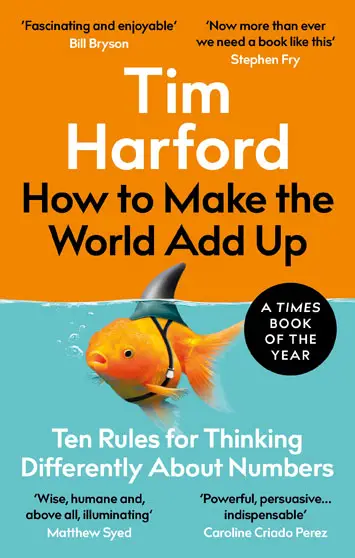How to Make the World Add Up by Tim Harford – Review

By Karl Hornsey
I’d been labouring under a misapprehension about Tim Harford that I’ve only just realised is completely false. For some reason, I had the economist, journalist and presenter as something of an overnight sensation, who had shot to greater attention over the last couple of years as his Radio 4 show, ‘More or Less’, became essential listening to make some sense of the world. However, upon doing a bit of research for this review, it turns out I was wrong.
For a start, Harford has presented ‘More or Less’ since 2007, has written four economics books and joined the Financial Times in 2003. So much for an overnight sensation. However, it is true that his work in debunking statements that have supposedly been backed up with statistics and facts has never been more of value than it is today. In an age in which politicians bend the truth, bandy figures around and, quite frankly tell outright lies that are soaked up by the public and press alike and passed on as fact, his work is essential in knowing who can be believed. And that, even is this crazy day and age, is fundamentally important.
 Having listened avidly to ‘More or Less’ to confirm or dent my opinions on, in particular, the Brexit debate, coronavirus and the inane ramblings of Donald Trump (remember him?), I was keen to get my hands on a copy of Harford’s latest offering, How to Make the World Add Up – Ten Rules for Thinking Differently About Numbers, and I’m delighted to say that it didn’t disappoint.
Having listened avidly to ‘More or Less’ to confirm or dent my opinions on, in particular, the Brexit debate, coronavirus and the inane ramblings of Donald Trump (remember him?), I was keen to get my hands on a copy of Harford’s latest offering, How to Make the World Add Up – Ten Rules for Thinking Differently About Numbers, and I’m delighted to say that it didn’t disappoint.
“A natural storyteller”
Harford uses 10 rules to guide readers through the minefield of misinformation that is out there not just now, but has been pedalled for many years, followed by the final Golden Rule that each and every one of us should follow – Be Curious. This, in a sense, sums up the book, in that it challenged my own preconceptions and made me open my mind much more to different opinions. Quite simply, this book makes you think.
In other hands, some of the subject matter could have been dry and quite frankly tedious, but Harford has a way of communicating on a level that anyone can understand, breaking down seemingly complicated arguments into ones that you could feel confident going down the pub and explaining to your friends. It’s also important to say that this isn’t a political offering or indeed one that takes sides in any way. Only the side of the truth.
Crucially, Harford is a natural storyteller with a sense of humour that allows him to dissect events involving such disparate historic figures as Florence Nightingale, John Maynard Keynes and even a Johannes Vermeer forgery, to paint a picture in the reader’s mind that seems to make the world so much clearer. And, right now, I think we could all do with a bit of that.
‘How to Make the World Add Up’ by Tim Harford is published by Little, Brown £9.99 paperback









